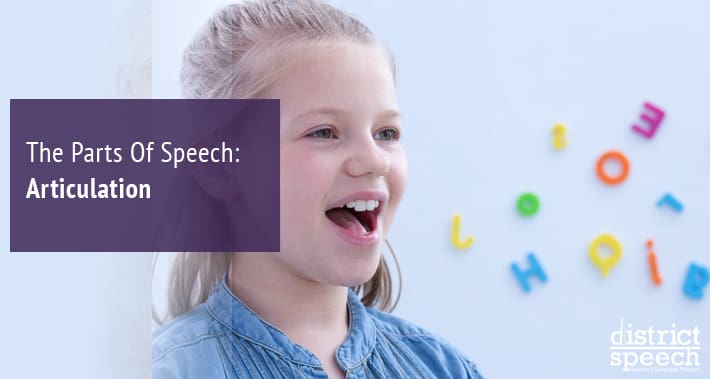
When we talk about speech, there are several different aspects that affect the sound that comes out of our mouth.
Today’s subject is articulation.
At District Speech in Washington, DC, we provide speech therapy for kids who have articulation disorders, which is one of several types of speech sound disorders.
But before we get a better understanding of articulation disorders, let’s have a closer look at what articulation actually is.
What Is Speech?
Speech is defined as how we say and pronounce words and sounds.
Speech can be divided up into several different categories:
- Articulation: how we produce sounds using various parts of our mouth
- Fluency: the rhythm of our speech, whether we stutter, or pause when we talk
- Rate: the speed at which you create sounds
- Resonance: the part of your vocal tract against which the sound vibrates
- Volume: how loud or quiet the sounds you make are
- Vocabulary: the number of different sounds you can create with your voice
RELATED: Frequently Asked Questions About Stuttering
Speech can be distinguished from language, as language embodies the meaning of the words and phrases we use and how we put them together.
Language can also be independent of sound – like the words in a book, for example.
Those words correspond to sounds, but they still hold their meaning independent of those sounds.
When you have trouble producing the actual sounds or have a problem with the voice, you have a speech disorder.
Speech disorders are either organic or functional.
Organic speech disorders result from sensory or neurological disorders, such as a hearing impairment.
Functional speech disorders relate to the motor production of speech sounds.
Articulation disorders are classified in this second group, as functional speech sound disorders.
Children often pronounce words incorrectly as they learn to talk, but by about four years of age, most children can say all speech sounds correctly.
If this is not the case, your child may have a functional speech sound disorder.
Another sign your child might have a speech sound disorder is if they have difficulty focusing.
If your child has issues with focus or articulation, the best course of action is to involve a speech and language therapist, who will test your child for issues.
If you suspect that your child may have an articulation disorder, here are some resources to help you understand what articulation is, and when you should get a speech therapist involved.
What Is Articulation?
When you think of the word articulate, you might think of someone who pronounces words in a very particular way, over enunciating.
It might also be somebody who’s good at using words to make their point very clearly.
But from a speech therapy perspective, articulation has to do with what we do with the parts of our mouth that we use to create certain sounds.
These parts include your teeth, lips, and tongue – these are known as your articulators.
For example, consider the word “teeth”.
To form the “T” sound, you place the tip of your tongue against the hard palate on the roof of your mouth.
To form the “E” sound, you then move your tongue down, stretch your lips apart, and speak through your teeth.
To form the “TH” sound, your teeth stay in the same position, but your tongue moves in between them.
Each of these actions is an articulation done by your articulators.
Every other sound you make with your mouth involves some sort of action with your articulators as well, whether it’s words, grunts, or a scream.
Common Speech Articulation Errors
If your articulators are doing their job, the result is clear speech or what’s referred to as intelligibility.
When your child has articulation issues their communication skills can suffer, and so early intervention is key.
A speech therapist will test your child for the following articulation errors, which can also be summarized by the acronym S.O.D.A.
1. Errors Of Substitutions
Substituting one sound for another at the start or end of a word, such as “wabbit” for rabbit, or “thoap” for soap, demonstrates one type of articulation error.
A toddler will commonly make these types of errors, but if your child does not grow out of this phase by age four, then speech therapy can help.
2. Errors Of Omissions
The omission of certain sounds in a word may indicate that your child has an articulation disorder.
For example: “pay” rather than “play”, or “poon” rather than “spoon”.
Errors of omission tend to produce the most unintelligible sounds, which can cause your child to be frequently misunderstood.
3. Errors Of Distortions
Errors of distortion occur when the sound of the word is produced in an unfamiliar way.
For example, using a lisp on an “s” sound so that the word “sun” sounds more like “shun”, or an “m” sound rather than a “p” sound in the word “pencil”.
4. Errors Of Additions
In this case the speaker inserts an extra sound into the word.
Examples include “buhlack” for black or “doguh” rather than “dog”.
The “buh” or “guh” sounds of b and g distort the word, rendering it less intelligible.

How Can A Speech Therapist Help With Articulation Disorders?
Recent studies have indicated that children with articulation disorders often have unique needs, which highlights the need for a comprehensive assessment in order to provide a tailored treatment plan.
Following assessment and diagnosis of an articulation disorder, a speech therapist will work one on one with your child to target the sound distortion error and correct it.
By practicing specific words and sounds, your child will learn to adapt and adjust their articulation.
Focusing your child on the mechanism of sound production, for example, the use of a mirror for visual feedback on the movement of the articulator, will lead to a more increased awareness of the issue and its correction.
The therapist may record your child to illustrate the issue and measure improvement.
Your child may be asked to judge correct and incorrect pronunciation in recordings of others, as an illustration.
Your child will also be given exercises to use at home to practice correct articulation in between visits.
There are even some great toys your speech therapist can recommend to promote continued learning at home.
Some examples include:
- Bubbles
- Alpha-Bots
- Happy Giddy Bowling Set
- Learning Piggy Bank
- Mr. Potato Head
- Scooter Board and Melissa & Doug Puzzles
- The Design Drill
Depending on the age of your child, your involvement as a parent is very important, so the therapist will work with both of you to determine the best course of action.
Every child learns differently, and what may work for one child may not work for another, so therapy will be adjusted and tailored toward their needs.
The earlier you begin treatment, the more successful your results, as younger children have not had as much time to develop their bad habits.
Book Your Appointment With District Speech Today
Speech therapy, when started early, has been proven to help developmentally delayed children catch up with their peers.
A speech therapist will not only diagnose the issue, but they will work within your child’s means to correct it.
Our speech therapists at District Speech have experience in helping children with a wide range of issues.
Don’t hesitate to get in touch if you have questions.
Book your appointment with District Speech today.
1300 I St NW, Suite 400 E,
Washington, DC 20005
- https://g.page/districtspeech
District Speech and Language Therapy specializes in speech therapy, physical therapy, and occupational therapy solutions, for both children and adults, in the Washington D.C and the Arlington Virginia areas.